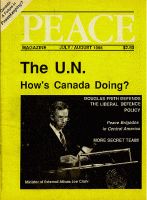
Peace Magazine Aug-Sep 1988, page 15. Some rights reserved.
Search for other articles by John Bacher here
A recent court decision in Florida has dismissed the Christic Institute's suit against twenty-four former U.S. intelligence agents and military officers for lack of evidence. The case is to be appealed.
It is a civil suit under the U.S. Racketeering Influenced Corrupt Organization Act. To be successful, it is not enough to establish that criminal events took place, but also that a conspiracy be demonstrated.
Even before dismissing the case, Judge King had reduced its scope to events that had supposedly taken place after 1983, whereas the Christic Institute had intended to bring in the entire twenty-five-year history of the "secret team." The dismissal of the case has little bearing on PEACE Magazine's series, which has dealt with the longer-term saga, and has drawn on published sources beyond the evidence collected for the court case.
In his decision, Judge King specifically noted an area or shortage of evidence. He said that the Institute "presented no direct evidence nor eyewitness testimony" that Per Anker Hansen (who was accused of committing a bombing at La Penca, Costa Rica) was present at the site where it took place. This accusation is hotly disputed by the Christic Institute, which has circulated a video that it says shows Hansen at La Penca and sneaking out before the explosion.
Judge King's decision is ironic, in that the Christic Institute was then suing in another federal court in Washington D.C. for evidence that could have provided some of the details that King says are lacking for the case to go to trial.
Critics have complained that Christic Institute Attorney Daniel Sheehan had weakened his case by extending it beyond the La Penca bombing to twenty-five years of covert CIA activities, headed by the dynamic duo of Theodore Shackley and Thomas Clines. The bombing itself, believes investigative reporter Martha Honey, whose husband was seriously injured in it, was organized to serve the closely related purposes of killing the independent liberal contra leader Eden Pastora and providing a pretext for the U.S. invasion of Nicaragua.
The lengthy process needed to appeal Judge King's decision will ensure that the Christic Institute case will not come before a jury until after the November U.S. Presidential election.
Revelations in a Senate Foreign Relations Subcommittee, chaired by Senator John Kerry, have established the connections between drug smugglers and the contras. Both George Morales and Garry Betzner have confessed to flying weapons to the contras from CIA-connected rancher John Hull's ranch in Costa Rica, and picking up cocaine.
Some journalists disputed the veracity of the testimony of drug smugglers. Indeed, a complex debate was printed in The Nation (August 29, and September 19, 1987) between Jonathan Kwitny, Daniel P. Sheehan, and TV producer Leslie Cockburn. Kwitny not only cast doubt on the pilots' stories, but tried to disprove them by showing that a plane Morales had mentioned had not been available at the time of the supposed flights, and that John Hull's air strip was too short for a fully-loaded plane of that description to have taken off there.
Subsequently, however, Senator Kerry has seemingly corroborated Morales's and Betzner's stories. He has played video-taped depositions of three former-contra leaders, whose statements confirm that drug money assisted their forces. Karol Prado, the southern contra front's second-in-command further explained that the rebels provided fuel to pilots carrying drugs when they landed at contra airstrips.
Although the drug-contra connection has been firmly established, the ties to the CIA remain more elusive. In an April 30, 1988 issue of The Nation, journalist David Corn illustrated the difficulties Kerry has experienced, hitting up against "the CIA wall" in his investigation. It was expected that Ambassador Robert Duemling of the State Department would tell the subcommittee that the CIA had propped up the Vortex Aircraft company, which smuggled arms and drugs for the contras. Duemling's testimony, however, was postponed.
Ramon Milian-Rodriguez, a convicted money-launderer for the Colombian Medellin cocaine cartel, claimed he had passed on its private drug profits to the contras. In a private session with the subcommittee, Milian-Rodriguez testified that he had funneled $10 million to the rebels through Felix Rodriguez, a former CIA agent with close ties to George Bush. These claims have not been publicly explored. However, Senator Kerry promises to do so in the future.
Another potential CIA network is that of former Israeli General Michael Harari, a top adviser to Panamanian General Noriega. According to a former Noriega aide, José Blandon, Harari operated airstrips throughout Central America to arm the contras and smuggle drugs. ABC News recently interviewed an American pilot who said he was part of this outfit and that he had brought drugs back to the United States. Kerry is currently investigating CIA connections to this operation behind closed doors. He is engaged in a delicate balancing act: The subcommittee's investigation could be closed down if he discloses classified operations. p

Peace Magazine Aug-Sep 1988, page 15. Some rights reserved.
Search for other articles by John Bacher here